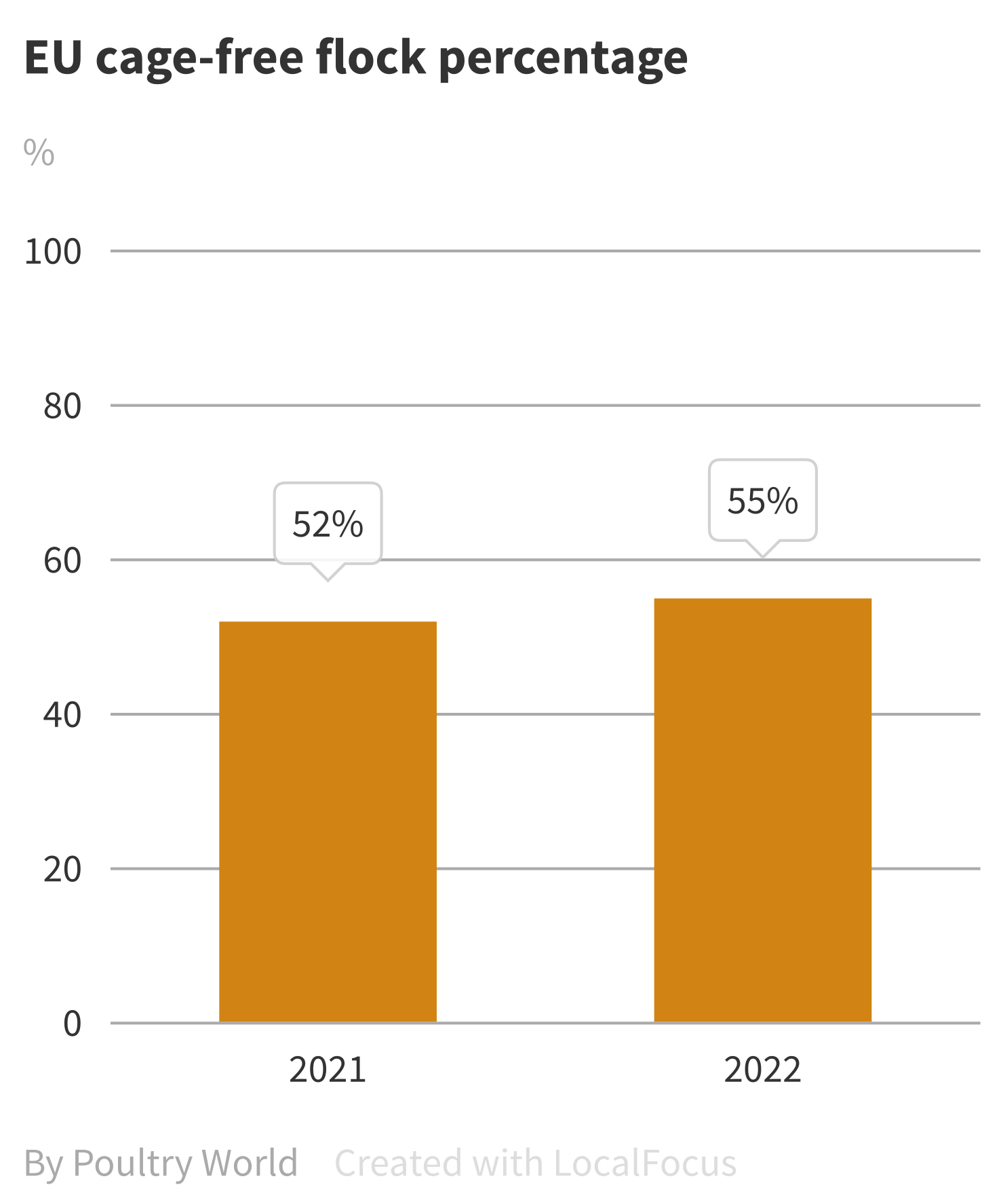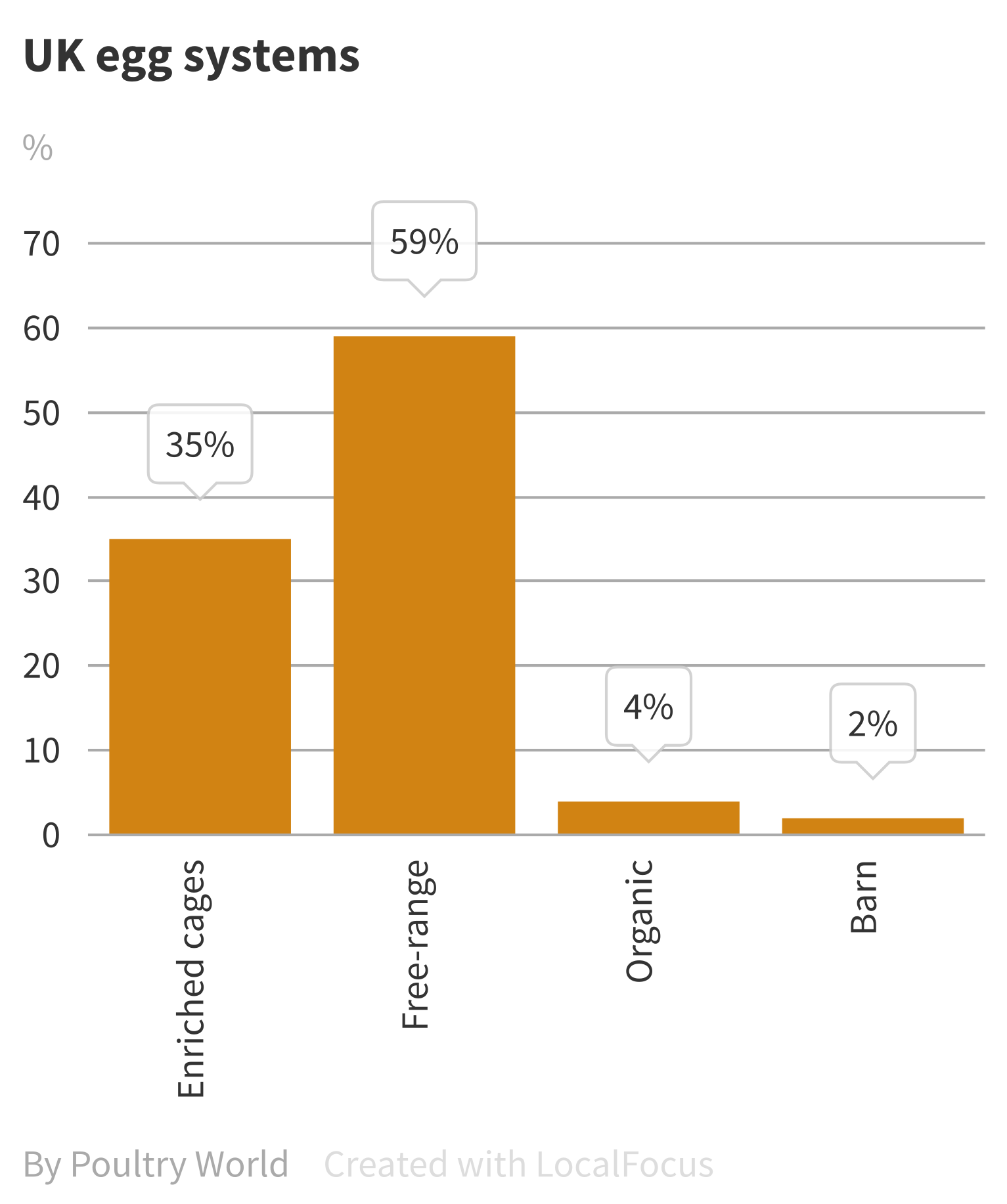
Global companies continue to move towards cage-free systems
- Hits: 1887
In the past year, several major companies, including Pizza Express, Yum! Brands and Bloomin’ Brands have made new global cage-free commitments, according to the 6th Egg Track report released by welfare charity Compassion in World Farming. This is despite the ongoing Covid-19 pandemic and the persistence of avian flu across many parts of the northern hemisphere.
There are 232 companies monitored in Egg Track of which 103 operate globally, 52 just in North America, 76 in Europe and 2 in the Asia-Pacific region. Of these firms, 175 (75.4%) report progress against their cage-free commitments, an increase from 71% in 2021, with an average of 79.1% transition to cage-free. Of the companies that reported global progress, their cage-free sourcing increased from 55.2% to 63.1% in the past 12 months.
“…we can see that cage-free eggs are swiftly becoming the industry standard.”
One firm that has successfully achieved 100% cage-free production throughout its global business is Danone, which believes animal welfare is a key pillar of its regenerative agriculture strategy. Cees Hollander, global farming expertise manager at Danone, said that when the company first committed to cage-free eggs and ingredients, it knew it wouldn’t be able to do it overnight and that it was vital to work with suppliers.
 Big Cat factory farms where distressed lions and tigers are stuffed into cages
Big Cat factory farms where distressed lions and tigers are stuffed into cages
 “But we persisted and reached our target of 100% cage-free eggs and egg ingredients in 2020. Tracking and reporting our progress are important ways to hold ourselves accountable inside and outside our company, answering consumers’ and investors’ growing demand for transparency and improvement via benchmarks like the Business Benchmark on Farm Animal Welfare (BBFAW). What’s exciting is that thanks to tracking from CIWF, we can see that cage-free eggs are swiftly becoming the industry standard.”
“But we persisted and reached our target of 100% cage-free eggs and egg ingredients in 2020. Tracking and reporting our progress are important ways to hold ourselves accountable inside and outside our company, answering consumers’ and investors’ growing demand for transparency and improvement via benchmarks like the Business Benchmark on Farm Animal Welfare (BBFAW). What’s exciting is that thanks to tracking from CIWF, we can see that cage-free eggs are swiftly becoming the industry standard.”
Market data shows that the EU cage-free flocks have continued to grow in the past year, with 109 of 128 companies reporting progress (85%), with their supply chains now standing at an average of 84.4% cage-free.
UK egg systems
 The enriched cage sector in the UK continues to decline with just a 35% market share, while the free-range sector accounts for 59%, organic 4% and barn 2%.
The enriched cage sector in the UK continues to decline with just a 35% market share, while the free-range sector accounts for 59%, organic 4% and barn 2%.
Compassion in World Farming welcomed the results but urged companies to be careful not to opt for systems like “combination” or “limited access” systems as they limit hen movement and are not considered a suitable alternative to caged housing. The charity is asking companies to publish updated language in their cage-free commitments specifying that they will not allow these systems in their supply chain.
It’s fantastic to see an increase in global commitments from leading companies who are showing a reasonable transition to cage-free.”
Some have already done so, including ALDI Nord, Barilla, Bennet, Carrefour Spain, Chef Express, Coop Italy, Tesco and Unilever.
The charity is to focus on cage-free ingredient eggs in its report next year, recognising the huge volume of eggs used in processed foods and which impact a high number of hens.
Dr Tracey Jones, global director of food business at Compassion in World Farming, said companies “still forging ahead with their cage-free commitments should be applauded. It’s fantastic to see an increase in global commitments from leading companies who are showing a reasonable transition to cage-free.”













